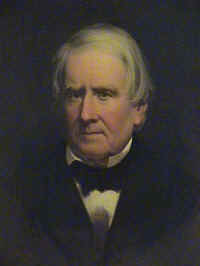
George Gray Leiper
Photo courtesy of Thomas W. Leiper, Stamford, CT
"[This] is a portrait of George Gray Leiper, by S.B.Waugh, circa 1861, when he was about 75. He is my great, great, great, great grandfather and this portrait presides over our dining room here in CT."
(A biographical sketch taken from One Hundred Years, The Delaware County National Bank Chester, PA 1814-1914)
Years in parentheses are years of service as a Director of The Bank of Delaware County and/or The Delaware County National Bank
Hon.
George Gray Leiper (1814-19, 1821, 1831), son of Colonel Thomas and
Elizabeth Coultas (Gray) Leiper, was born in Philadelphia, February 3,
1786. In 1803, before he attained his seventeenth year,
George G. Leiper graduated from the University of Pennsylvania, and
shortly after was placed in charge of his father's extensive snuff works
and quarries along Crum creek.
From
his earliest manhood, George G. Leiper was known as of "Lapidea,"
now the property of Hon. William C.
Sproul, and for many years was esteemed as the wealthiest man in the
section, where, in an unbroken chain the Leiper realty holding extended
for seven miles.
Eminently
a religious man, in 1811, then twenty-five years of age, Mr. Leiper
established at his house the first Sunday school in the history of
Delaware county, out of which movement ultimately grew the Leiper
Presbyterian Church, in Ridley township, which he erected in 1818,
personally defraying the total cost incurred in building and outfitting
that sanctuary.
During
the War of 1812 he was first lieutenant of the Delaware County Fencibles,
commanded by Captain James Serrill, and with the Twenty-second Regiment,
of which that company was part, was mustered into the service of the
United States, September 24, 1814, and was with the forces concentrated at
Camp duPont, and later at Camp Gaines, Marcus Hook, when General Ross and
Admiral Cockburn threatened Philadelphia and the Delaware river towns in
the fall of that year.
He
was a member of the Legislature in 1822-23, and his advocacy in that body
of a State appropriation for the maintenance of the Deaf and Dumb Asylum
in Philadelphia was so effective that in recognition of his efforts, he
was elected as director of that institution, and annually thereafter for
forty-five years, until his death, he was re-elected to membership in the
board. He was one of the appointees in 1824 to represent Delaware county
in the reception of Marquis de Lafayette. In 1828, he was Representative
from this District, serving in the twenty-first Congress, and although the
nomination was tendered him and he was strongly urged by President
Jackson, a warm personal friend, to be a candidate for a second term, he
refused, notwithstanding his election to the office was a foregone
conclusion. At that time Mr. Leiper had just completed the canal projected
by his father and John Wall in 1790, and he believed that so enormous
would be the growth of the output of the Leiper quarries, that he must not
sacrifice his personal affairs to give attention to those of the nation.
The fact is, the canal never paid even its current expenses, much less a
dividend upon its cost.
On
February 25, 1843, Governor Porter appointed George G. Leiper an Associate
Judge of the Courts of Delaware County, and February 16, 1848, he was
re-appointed to the bench by Governor Shunk, continuing to serve therein
until the office was made elective, and his successor had been chosen by
the people at the election in October, 1851, Judge Leiper having declined
to be a candidate. His active public career closed with his retirement
from the bench. Hon. George G. Leiper died at his house at Lapidea,
November 18, 1868, aged 82 years, 9 months and 14 days.
[Obituary]